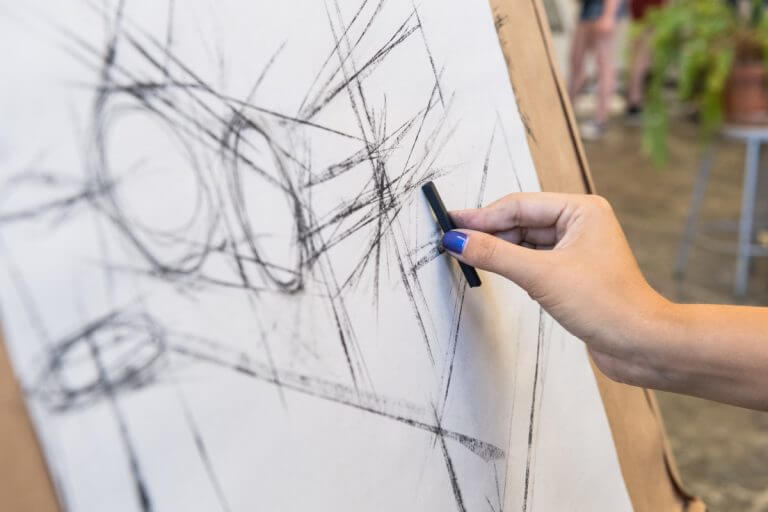
Located in Ann Arbor, Michigan, the Stamps School of Art & Design at the University of Michigan sees creative practice as an engine for cultural change and innovation. As one of the first schools of its kind to put both technical and conceptual skills at the heart of its transdisciplinary curriculum, the school has long recognized the role that artists and designers play in achieving positive social change. The school calls this recognition “engaged creative practice” and it is the beating heart of the school’s curriculum. The Stamps School faculty practice what they preach: engaged creative practice is a theme that runs strong throughout their work.
Having constructed his off-grid family home entirely out of natural materials, it’s fair to say that Stamps Professor Joe Trumpey, knows his stuff when it comes to sustainability. A cornerstone of his teaching is helping students gain first-hand experience with sustainable designs, materials, and building methods. Drawing on lessons learnt while building his own home, in the spring of 2017 Trumpey and 22 undergraduates built a new building for the U-M Biostation from the ground up using an ancient straw bale technique. Made almost entirely from natural materials, this structure stands as a fantastic example of an alternative mode of living.

Professor Joe Trumpey’s home
Further afield, Trumpey has taken his students to Gabon to introduce lightweight and practical ‘cook-stoves’ made of aluminium cans to residents in rural villages. These devices are a cheap and practical way of boiling water efficiently and ensuring clean drinking water in places where it can’t be guaranteed. Closer to home, in Detroit, Trumpey and his band of “Eco-Explorers” – as those studying under Trumpey are dubbed – helped community leaders turn a patch of unused land into a park including a swing set; a sandbox; a zip line; a picnic shelter; garden beds; a clay pizza oven; and a fire pit with drainage and seating, transforming an otherwise underappreciated neighborhood.
The faculty at Stamps come from a wide range of backgrounds, but they remain united in their desire to change the world for the better. Former Google Software Engineer, Professor Sophia Brueckner, strives to find new ways to think about technology and how it affects the human experience.
Bruekner is mindful that when many people think about tech, their opinions often fall into one of two extremes: that technology is the solution to all the world’s problems, or that it represents a great danger. She promotes the Science Fiction genre as a helpful way of overcoming this polarization and identifying the dangers and opportunities in technology. Her ‘Science Fiction Prototyping’ course encourages students to use this method by requiring students to read and discuss a science fiction book before creating functional prototypes based on their research.
When not teaching, Bruekner creates new and unique technology that challenges the prevailing norms of tech. Bruekner invented the Embodisuit, a wearable device that’s worn under the clothes and allows users to ‘feel’ information through areas of the suit which can be programmed to change temperature or vibrate. By allowing the user to take data through the skin, Bruekner aims to change the way people live with data and this, she hopes, will change the type of data that people create.

Bruekner’s Empathy Box
Another area Bruekner is interested in is what she sees as a trend towards technology being used as a harvester of personal data for corporate ends. Her creative work disrupts this trend, encouraging people to use technology differently, with human caring at the center of the design. Bruekner’s Empathy Box and Empathy Amulet, allows its users to form a sense of connection with strangers by sharing warmth across the device. By gripping the device the users were able to connect with others in a way that would not be possible without technology. For Bruekner, this last point is especially important — that technology creates new ways for people to interact, without replacing our real-life interactions in any way.
Interaction Designer and Professor Sun Young Park is yet another Stamps faculty member using her design skills to enhance human interactions — this time in the realm of medical care.
Sharing difficult news about chronic or terminal illnesses with anyone is difficult; sharing this with pediatric patients is heart-wrenching. As hard as sharing bad news with a child can be, existing data suggests that when children are directly involved in the discussion and care of their conditions, they are more likely to adhere to their treatment plans and avoid anxiety, sadness, and confusion. Sun Young Park hopes to design new systems, practices, and possibly products that makes honest information sharing with children easier for families and medical professionals.

Professor Sun Young Park
Before launching into the design phase, Park — a 2017 National Science Foundation (NSF) grant recipient – has committed to a two-year design research project to get a thorough understanding and assessment of the challenge in practice. Park’s design research project, conducted with the University of Michigan Mott Children’s Hospital, utilizes a design research method that includes observation, interviews, and data synthesis to systematically uncover specific barriers to sharing difficult medical news with children.
Her unflinching and thorough look into this highly-emotional terrain is sure to make for a strong, meaningful, and effective design.
The faculty at Stamps strives to improve the world through engaged creative practice. For students, the opportunity to be involved with these individuals — and often in their creative projects — is truly invaluable. At Stamps, students learn to do more than just make great creative work. With strong faculty mentors, they make great work that makes a difference.
Follow Stamps on Twitter, Facebook and Instagram
Liked this? Then you’ll love these…
Creating Change: Stamps’ social entrepreneurs are ones to watch
Stamps Pre-College Programs: Giving High School Art students a gateway to College education







